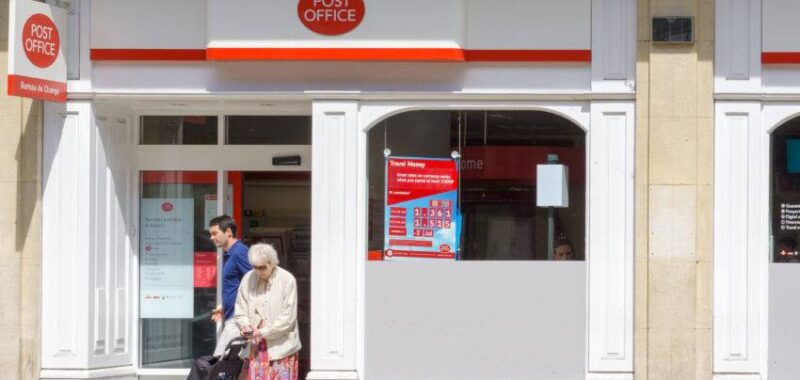The Post Office has announced potential closures of 115 Crown Post Office branches, placing up to 1,000 jobs at risk in a significant restructuring aimed at reducing losses.
The proposed changes may lead to franchise arrangements with third-party operators like WHSmith taking over affected branches. However, this shake-up has drawn sharp criticism from unions and community advocates.
The Communication Workers Union (CWU) condemned the timing, as the move coincides with the ongoing Horizon IT scandal inquiry, labelling it “immoral” and “tone deaf.” The Horizon scandal, in which hundreds of sub-postmasters were wrongly prosecuted due to faulty software, remains fresh in the public memory, with many calling for transparency and justice.
Under new chairman Nigel Railton, the Post Office aims to put the organisation on a more sustainable financial footing amidst challenges like competition from parcel operators and declining letter revenues. Losses reached £81 million in the 2022-23 financial year, with nearly half of its branches operating at minimal or negative profitability.
Railton emphasised the need for a “fresh start,” with plans to invest £250 million annually in the network by 2030, contingent on government support. This includes an improved banking offer and a modern, “lower-risk” IT system, addressing long-standing technology issues. Railton described the process as “right-sizing” the organisation to better meet future demands.
Growing Community Dependence on the Post Office
With bank branch closures escalating across the UK, Post Offices have become essential for cash and banking services in local communities. The closures, if they proceed, will disproportionately impact rural and urban communities where alternatives are limited. In July alone, over £3.7 billion was withdrawn or deposited at Post Offices, highlighting their critical role.
Community advocates, like Martin Quinn from *Campaign for Cash*, argue that the government should treat the Post Office network as essential infrastructure. “This is another nail in the coffin for communities that rely on the Post Office for cash access,” he warned, urging the government to halt the closures.
The government has been in “positive” discussions with Railton, with Business Secretary Jonathan Reynolds suggesting that Post Office branches could step in to fill gaps left by bank closures. However, with the rapid rise of digital banking, the viability of a high-street-based strategy remains uncertain.
Separately, ministers are considering transferring Post Office ownership to sub-postmasters to protect local services. A government spokesperson stated, “We are in active discussions with Nigel Railton to strengthen the network for a sustainable future.”
Impact on Jobs and Local Services
The proposed closure list includes branches across the UK, from major city centres to rural areas, affecting towns such as Glasgow, Oxford, London Bridge, and Stornoway. The Post Office has stressed it does not plan to reduce its total network of over 8,500 independently run branches. However, CWU officials argue that this move risks further alienating communities dependent on the Post Office network.
Here is a full list of the branches affected by the Post Office’s closure plans:
Antrim
Bangor
Belfast City
Edinburgh City
Glasgow
Haddington
Inverness
Kirkwall
Londonderry
Newtownards
Saltcoats
Springburn Way
Stornoway
Wester Hailes
Barnes Green
Bransholme
Bridlington
Chester Le Street
Crossgates
Eccles
Furness House
Grimsby
Hyde
Kendal
Manchester
Morecambe
Morley
Poulton Le Fylde
Prestwich
Rotherham
Salford City
Sheffield City
South Shields
St Johns
Sunderland City
The Markets
Birmingham
Breck Road
Caernarfon
Didsbury Village
Harlesden
Kettering
Kingsbury
Leigh
Leighton Buzzard
Matlock
Milton Keynes
Northolt
Old Swan
Oswestry
Oxford
Redditch
Southall
St Peters Street
Stamford
Stockport
Wealdstone
Barnet
Cambridge City
Canning Town
Cricklewood
Dereham
Golders Green
Hampstead
Harold Hill
Kilburn
Kingsland High Street
Lower Edmonton
Roman Road
South Ockendon
Stamford Hill
Bideford
Dunraven Place
Gloucester
Liskeard
Merthyr Tydfil
Mutley
Nailsea
Newquay
Paignton
Port Talbot
Stroud
Teignmouth
Yate Sodbury
Baker Street
Bexhill On Sea
Cosham
Great Portland Street
Croydon High Street (10)
Kensington
Knightsbridge
Melville Road
Paddington Quay
Portsmouth
Raynes Park
Romsey
Westbourne
Windsor
Worlds End
Aldwych
Brixton
Broadway
City of London
Clapham Common
East Dulwich
Eccleston Street
High Holborn
Houndsditch
Islington
Kennington Park
London Bridge
Lupus Street
Mount Pleasant
Vauxhall Bridge Road

